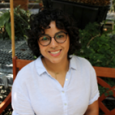NGCP is celebrating National Mentoring Month this January by highlighting the importance of mentors in empowering girls and young women to actively pursue STEM education and careers. In advance of our upcoming webinar “The Impact of STEM Role Models and Mentors” on January 26th, I had the pleasure of interviewing two of our panelist speakers, Dr. Jessica Hua and her Ph.D. student Isabela Tuthill, about the many ways mentoring continues to play an important role in their professional and academic journeys.
Dr. Jessica Hua is an Associate Professor at the University of Wisconsin-Madison who studies the effects of human activities on aquatic systems and the science of science communication. Her mentee, Isabela Tuthill, is a doctoral student who studies how microbial evolutionary responses to anthropogenic contaminants such as antibiotics affect disease dynamics. Come dive into the dynamics of their relationship and the advice they share with future generations of female scientists.
Amanda: Dr. Hua, can you tell me a little bit about your field of research?
Jessica: Research in the Hua lab at the University of Wisconsin–Madison utilizes an interdisciplinary approach to address two main goals: (1) to understand ecological interactions, evolutionary processes, and eco-evo feedbacks in human modified environments and (2) to evaluate the role of outreach and community (citizen) science in shaping public perception and understanding of science. In other words, we are interested in asking questions like: Can pollutants like light pollution or microplastics influence why some communities are more susceptible to disease? Or can protecting biodiversity also protect communities from their diseases? We are also interested in collaborating with members of the community from 3rd graders to retirees to collect environmental data. We want to know whether participating in the scientific process can improve how community members view and understand science.
Amanda: The work your lab is doing sounds fascinating and I love how you are collaborating with members of the community to collect data. Isabela, can you share a little bit about your Ph.D. research and how you became interested in your topic and working with Dr. Hua?
Isabela: I study how microbial (bacterial) evolutionary responses to antibiotic contamination influence disease outcomes.
I got interested in this topic during my last semester as an undergraduate student. While working in a chemistry lab, I started to wonder how chemicals released into the environment affect hosts, parasites, and therefore disease outcome. I then reached out to Dr. Hua, who at the time was my Ecology professor, and she helped me to shape my thoughts into a research question.
Amanda: That sounds like the beginning of a powerful mentoring relationship. What has been the highlight of your experience working with Dr. Hua?
Isabela: Hmm, it is a difficult question as there are many. I think that the major highlight of working with Dr. Hua is that she makes you feel seen. She is always happy to listen to your ideas and challenges you to think critically in order to find the right words to express your ideas properly.
Amanda: Feeling seen is so important. I had a mentor that made me feel the same way while completing my Ph.D. How about you, Dr. Hua, what has been the highlight of your experience mentoring Isabela?
Jessica: My favorite experiences with Isabela have been experiencing those moments of excitement when developing a new idea or mastering a formerly difficult topic or that amazing feeling when confronted with a new discovery. It has been so amazing to be able to share those moments with Isabela.
Amanda: I love those “aha!” moments when a new discovery is made! It must be powerful to experience those alongside one another. Dr. Hua, what is most important to you when it comes to mentoring girls or young women hoping to pursue a career in STEM?
Jessica: From my parents who were forced to leave their home country to give me the chance at a better life, to my mentors and advisors who took a chance on someone with limited experience and guided me through the winding path of research and academia. My past shapes my personal mentoring philosophy of using my lab as a platform to provide as many high-quality opportunities for girls and young women as we can.
Amanda: Our pasts impact us in so many ways. It is powerful to hear more of your personal story and how it impacts your mentoring philosophy and how you strive to use your lab.
Here’s a fun question: in five words (or less), how would you describe your journey into a career in STEM?
Jessica: Non-traditional, challenging, rewarding, fun, unexpected
Isabela: Challenging but worth it.
Amanda: I think many of us across career fields can relate to those sentiments! Any last advice either of you would you give to girls out there who might be interested in pursuing a career in the sciences?
Isabela: Believe in yourself! I know it is very difficult to keep going, but you can do it! Put all your heart into it and fight for it and you’ll see that all that effort will not be in vain. I believe in you and all the amazing things you will accomplish!
If you would like to learn more about the experiences of Dr. Jessica Hua and Isabela Tuthill, join NGCP for our upcoming webinar “The Impact of STEM Role Models and Mentors” on January 26th from 4-5pm PT / 7-8pm ET. This webinar will feature a panel of speakers including dynamic professionals in STEM who currently serve as mentors and the female students they are mentoring. Speakers will share their unique perspectives, their journeys, and advice on how mentoring can be a tool for supporting sustained career success in STEM. Want to learn more about role modeling and mentorship? Check out these useful NGCP resources:


